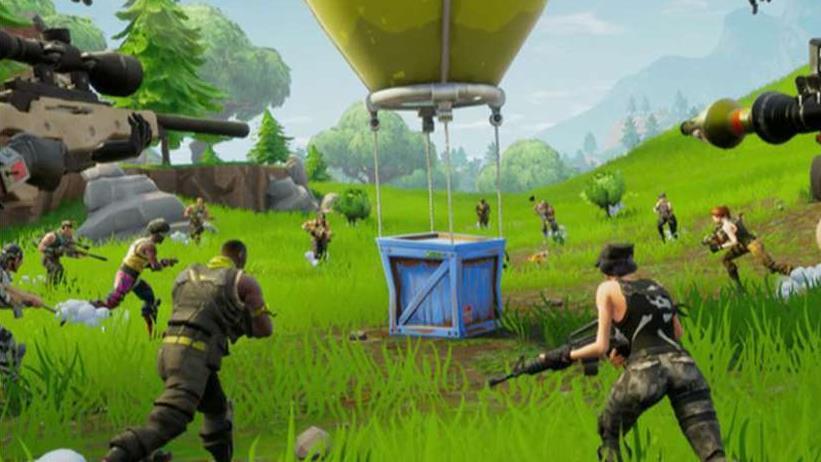The 'Fortnite effect' shakes video game industry, but is it here to stay?
Some of the world’s top video game publishers may be experiencing the “Fortnite effect,” as industry leaders such as Activision Blizzard and Electronic Arts are reporting weak results even as the battle royale sensation earns billions in revenue.
Unlike traditional blockbuster video games with multi-million dollar production budgets and $60 price tags, "Fortnite" utilizes a free-to-play model, where users can purchase cosmetic upgrades for their characters. The game drops players into a sandbox environment to scavenge materials and battle each other to survive.
Shares of Take-Two Interactive, Activision Blizzard and Electronic Arts all declined this month as the companies reported lackluster quarterly results or outlooks. "Fortnite’s" unprecedented success has sparked fierce competition among video game publishers for the attention of consumers and raised questions about which business models will succeed in the industry’s future.
“'Fortnite' is more than a threat or even disruptor at this point – it is a legitimate competitor, especially with the support of China’s Tencent, which is one of the largest companies in the world, and the larger gaming companies have taken notice,” CFRA analyst Scott Kessler said.
Despite record-settting revenue in 2018, Activision Blizzard, which produces mainstream games such as “Overwatch” and “Call of Duty,” cut 800 jobs this month and said it expected revenue to decline by nearly 20 percent in 2019, citing a lack of major upcoming releases. Electronic Arts attributed a shortfall in third-quarter revenue to intense competition from other games, with CEO Andrew Wilson noting that “Battlefield V,” a major franchise that launched without a battle royale game mode, “didn’t resonate as strongly as we would have liked” with consumers.
| Ticker | Security | Last | Change | Change % |
|---|---|---|---|---|
| EA | ELECTRONIC ARTS INC. | 139.39 | +2.81 | +2.06% |
| TTWO | TAKE-TWO INTERACTIVE SOFTWARE INC. | 204.41 | -3.72 | -1.79% |
| ATVI | NO DATA AVAILABLE | - | - | - |
Take-Two fell short of Wall Street’s expectations despite the massive success of “Red Dead Redemption 2,” a cinematic western that relied entirely on a single-player story mode at launch and only began to roll out multiplayer content in recent months. The company also produces the “Grand Theft Auto” series, which boasts a vibrant online community but isn’t free to play.
“The established companies continued to invest in established franchises and intellectual property, but users have become accustomed to free-to-play. These companies aren’t sure how to or where to invest,” Kessler added.
Within months of its release in July 2017, "Fortnite" became a viral sensation, drawing attention from celebrities such as rapper Drake and Pittsburgh Steelers star JuJu Smith-Schuster. Publisher Epic Games leveraged the game’s approachable style of play and streaming platforms such as Twitch to build a base of more than 200 million registered users, generating revenue of roughly $3.5 billion in 2018 alone.
"Fortnite’s" success has caught the attention of business leaders outside the video game industry. Netflix executives said in a recent note to investors that the game, not HBO or any other streaming service, was the company’s biggest competition for audience.
Still, the “Fortnite effect” on other video game companies may be overblown, according to Wedbush analyst Michael Pachter. While “Fortnite” has likely played some role in hurting revenue or drawing users away from other companies, he notes that other factors, such as Activision’s timing of game releases and EA’s poor execution of its “Battlefield” release, have been larger impacts on recent results. Some industry leaders, such as Take Two, have “done nothing wrong” from a business perspective, he said.
“The effect will not worsen. 'Fortnite' is doing great, but it’s not growing anymore,” Pachter added. “The impact in 2019 will likely be the same as it was in 2018, which means the impact is not worsening."
Major publishers have already begun to adapt to "Fortnite’s" recent dominance. EA recently released its own free-to-play battle royale game, “Apex Legends,” which drew 25 million registered users within one week of its launch. By comparison, it took "Fortnite" three months to break the 30 million user barrier.
Other companies can turn existing products into "Fortnite" rivals.
CLICK HERE TO GET THE FOX BUSINESS APP
“The market presumes nothing will ever change. Apex is a response to 'Fortnite,' and Activision and Take-Two can just make 'Overwatch' and 'GTA Online' free to play, respectively, to fight back,” Pachter said.

